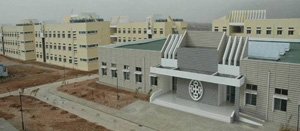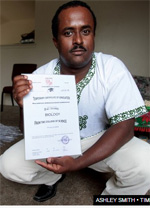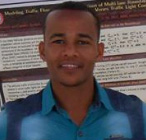
Compiled and researched by Resoum Kidane
Pt 6.4d. An overview on Tertiary education from 2006 to 2016
In 2006 the Eritrean government closed down the University of Asmara under the pretext of undergoing a transitional period. Yet other Sub-Saharan African countries like Ethiopia which were still in a transition period were also expanding their higher learning institutes without closing down their old main universities. Since 2000 Ethiopia’s higher education sector has grown from two public universities to 30 private and public universities, the Ethiopian government has expanded higher education while retaining the first higher education institution, Haile Selassie University, which was established in 1961. the Alameya University was established in 1985. http://wenr.wes.org/2011/06/wenr-june-2011-feature.
In Eritrea, the University of Asmara which was the sole institution of higher education was closed and replaced by the following seven new institutes of higher learning which are located in different areas
- Agricultural Colleges at Hal Hale and Hagaz,
- Technical school in Massawa,
- Teacher training institute at Adi Keih,
- Eritrean Institute of Technology at Mai Nefhi
- College of Marine Sciences & Technology (COMSAT), Massawa.
- Halhale College of Business and Economics (HCBE), Halhale.
- Orotta School of Medicine and Dental Medicine Asmara
Before 2004 these new colleges were functioning as parts of the University of Asmara. For example the College of Health Sciences was established at the University of Asmara, in 1995, but later in 2005 the College of Health Sciences was renamed Asmara College of Health Sciences (ACHS) and then became an independent college. Similarly other colleges became institutions of higher education independent from University of Asmara after 2004.
The Eritrean government states that the reason for opening these new institutions is:
- To expand higher learning institutes outside the capital city
- To make higher education more accessible to students
- To increase student population.
- To offer a wide range of bachelor and diploma courses at both undergraduate and graduate level. Example the Eritrea Institute of Technology (EIT), offer a wide range of bachelor degree programmes in science, engineering and education subjects.
- College of Education offers 4 year bachelor degree programs in the following disciplines:
·Biology Education
·Chemistry Education
·Educational Administration
·Mathematical Education
Physics Education
2. College of Engineering offers Bachelor degree programs at the College of Engineering:
·Aeronautical Engineering
·Chemical Engineering
·Civil Engineering
·Computer Engineering
·Electrical Engineering
·Mechanical Engineering
·Mining Engineering
Process Engineering
.3. The College of Science offers Bachelor degree programs offered at the College of Science:
·Biology
·Chemistry
·Mathematics
·Physics
·Computer Science
·Geology
·Library Information Science
If the main purpose of expanding higher learning Institutes is to increase the student population as well as offer more degree courses, one could argue that for achieving this purpose the UOA should not have been closed in 2006. This raises the question why was the UOA was closed?
The Eritrean government closed the university of Asmara out of fear of intellectuals who could claim freedom of speech and democratic debate. . (Shanta Barley (2012) states that Afwerki has effectively destroyed intellectual freedom in Eritrea “No independent academic research in any field is possible.” Fundamental research “or what is left of it” is now under pressure to pursue “practical” issues with immediate applications to development. Shanta Barley, adds that Eritrea is one of the few remaining countries in Africa that have failed to embrace scientific freedom.
Critics also claim that following the cracked down on the reformist movement and the suppression of the students’ protest to the summer work programme in 2001 the Eritrean government had no interest in the development of Asmara University. One could conclude that the main reason for closing of the university was political seeking full control of the government on colleges and students through the use of military style supervision. This military style supervision could be seen from the Eritrea Institute of Technology (EIT) which is the largest college to be established.
The EIT is the main local institute of higher studies in science, engineering and education. It is administered by Colonel Ezira, a former administrator of Sawa. At EIT students are not only allowed to choose the subject they want and the students and academic staff are under close watch.
According Richard Reid, a historian at the School of Oriental and African Studies in London was told a visit to the the Eritrea Institute of Technology in Mai Nefhi, the students who cheated on exams or skipped classes were jailed on site. Military training was mandatory between 4 and 7 a.m., and students wryly referred to digging trenches as 'digology', adds Reid.( http://www.nature.com/news/science-in-the-developing-world-eritrea-s-shattered-science-1.11671
Dr Sara who served Asmara University and other so called colleges for over 25 years in different levels also confirms that students at the Eritrea Institute of Technology in Mai Nefhi wake up early in the morning for boot camp (running, exercising, etc) and come to classes after quick breakfast without having the chance to go to their dormitories to wash. Everyone is under surveillance from the government. The classrooms were made of glasses and it was normal for the security people to watch and intimidate students and teachers from outside. At times, the security personnel enter classrooms without permission and sit with the students to listen to what may be going on.[ http://assenna.com/the-lives-and-times-of-asmara-university-1958-2003-and-other-colleges-according-to-professor-sara-uqbai/comment-page-1/
Although in 2007 the Eritrea government opened the Orotta medical school in collaboration between the Ministry of Health, the George Washington University Medical Center and 'Physician, in 2011, Afwerki ordered all scientists from George Washington University — including Dr Haile Mezgebe the medical director of the school, to leave the country. This is shows that Issayas has never ceases a suspicion of intellectual elites even after closing the UOA.
Eritrean science has now gone into reverse, say a number of scientists and doctors in exile. In response to mounting criticism from the United Nations and the United States over the country's human-rights record, Eritrean President Isaias Afwerki is severing partnerships with all US universities, says Ghebrekidan. “Everything that Eritrea has worked so hard to achieve is at stake (Shanta Barley 2012)
By and large since 2002, the younger generation who fail the college entrance exam in Sawa is largely engaged to road construction, dam and house building As a result of forced labour, detention, torture and prolonged military conscription the number of young graduates from higher education in Eritrea like Mulu Ghebrekidane who fled increased significantly. This contributed to the brain drain.

Mulu Ghebrekidan, a refugee from Eritrea, holds a diploma he recieved from the University of Asmara for a biology degree he has from 2004.[courtesy ASHLEY SMITH • TIMES-NEWS]
Ghebrekidan earned a bachelor’s degree in biology from the University of Asmara in Eritrea, right before fleeing the country to avoid obligatory military service in a conflict he didn’t support. But universities in Eritrea don’t give graduates official copies of their diplomas unless they’ve completed five years of forced government service. The only proof Ghebrekidan has of his work in college is a “Temporary Certificate of Graduation,”a print-out composed with WordArt in Microsoft Word. When he left Eritrea, he brought along his certificate, but that doesn’t count as proof of his degree. He is now a night shift worker at SL Start, a program for children and adults with developmental disabilities, and takes classes at College of SouthernIdaho during the day. Eventually, he hopes to enter the college’s nursing program, then transfer to a medical school where he can study to become a general practitioner.
Ghebrekidan future hopes are to return to Eritrea — after he receives his medical license, and, more importantly, after the violence dies down. Eritrea has a critical shortage of doctors, he said, and he’d like to help. source http://www.eritrea-beligerance.com/2012/09/eritrean-graduate-refugee-population.html.
ኣማኑኤል ተስፋስላሰ 
ኣብ ኣዲስ ኣበባ ዩኒቨርሲቲ (ኣራት ኪሎ) ብዘመዝገቦ ኣካዳምያዊ ውጽኢት ቀዳማይ ዝወጸ ኤርትራዊ ስደተኛ ብሰንኪ ዜግነቱ ናይ ወርቂ ሽልማት ከምዝተነፍጎ ተፈሊጡ።
ኣማኑኤል ተስፋስላሰ ዝተባህለ፣ ኣብ ኣዲስ ኣበባ ዩኒቨርሲቲ (ኣራት ኪሎ) ናይ ስነ ቁጽሪ (Applied Mathematics) ትምህርቱ ተኸታቲሉ ዝለዓለ ነጥቢ ዝረኸበ ብልሂ ኤርትራዊ ተማሃራይ ስደተኛ፣ ካብ ኩሎም ተማሃሮ ዝለዓለ ውጽኢት ረኺቡ ክንሱ፣ ኣብ እዋን መመረቕታ ንዕኡ ዝግባእ ናይ ወርቂ ሽልማት ካብ ናቱ ዝተሓተ ነጥቢ ዝነበራ ኢትዮጵያዊት ተማሃሪት፣ ካብ ኢድ ቀዳማይ ሚኒስተር ኢትዮጵያ ኣቶ ሃይለማርያም ደሳለኝ ከምዝተሸለመቶ ምንጭታት ሓቢሮም። ናይ ተማሃራይ ኣማኑኤል ተስፋስላሰ GPA 3.94 ክኸውን ከሎ ናይታ ትሕቲኡ ዝነበረት ተማሃሪት GPA 3.91 እዩ ነይሩ። ይኹን እምበር፣ ኣማኑኤል ብሰንኪ ዜግነቱን ስደተኛ ብምዃኑን ሽልማት ከምዝተነፍጎ እቶም ምንጭታት ኣረዲኦም።
ተማሃራይ ኣማኑኤል፣ ቅድሚ እቲ ወግዓዊ መመረቕታ ብመሰረት ዘመዝገቦ ልዑል GPA ኣብ ኣራት ኪሎ ቀዳማይ ምዃኑ ተነጊሩዎ ኣፈናዊ ሽልማት ‘ውን ተዋሂቡዎ ክንሱ ኣብቲ ኣብ ሚልየነም ኣዳራሽ ዝተገብረ ሃገራዊ ስነስርዓት መመረቕታ ግን ድሕሪኡ ዝነበረት ኢትዮጵያዊት እቲ ወርቃዊ ሽልማት ተዋሂቡዋ።
ቅድሚ ሕጂ ኣብ እስራኤል ኣብ ቅድድም ጉያ ብተደጋጋሚ ግዜ ቀዳመይቲ እትወጽእ ዝነበረት ኤርትራዊት ትሕቲ ዕድመ ተማሃሪት ኣትለት ራሄል ገብረጻድቕ ‘ውን ስደተኛ ብምዃና ጥራይ ኣብ ክንድኣ ብድሕርኣ ዝኣተዉ እስራኤላውያን ቆልዑ ይሽለሙ ከምዝነበሩ ይዝከር። እዚ ኸኣ፣ ዕዳ ስደት ክሳብ ክንደይ ከቢድ ምዃኑ ዘጕልሕ ተወሳኺ መርኣያ እዩ source http://assenna.com/
All shows how Eritrea has lost bright and intelligent educated people since 2002
Generally today approximately more than 300, 000 Eritrean youth of the 70s, 80s and 90s generations are living in exile in different countries: Ethiopia, Israel, Sudan, Western European countries etc.,. After Syrians and Afghans, Eritreans are the third largest nationality to cross the Mediterranean Sea, Al Jazeera reported.
BerhaneTowelde who completed the research on Migration in Eritrea in 2003 states that the worrying thing about this emigration is that those migrating in large numbers are the most productive categories of the labor force.
The biggest tragedy in Eritrea is the deliberate and systematic destruction of the youth, not only by killing, imprisoning them but by also depriving them of Education. When one meet the youth that were lucky enough to come to the first world, one is shocked the degree of ignorance and illiteracy prevalent in them. The majority of them are practically no better (education wise) than their great grandfathers who didn't have any education opportunities.
Education started to go into reverse with the beginning of the armed struggle but got much worse during the armed struggle and since independence in 2001.
Eritrean society is now much more likely to have an acute shortage of professionals and para-professionals. Fetsum Abraham ] states that Afwerki destroyed the only accredited University in our country (Asmara University employed about “160 Doctors” by the time was closed in 2006. http://assenna.com/the-lives-and-times- Afwerki stands alone as the only anti-education dictator.he did his incalculable damage to the Eritrean society in terms of ignorance like no one ever did to them, except the Italian colonizers. The result is an uneducated generation that would cost our society for generations to come
It is a paradox of today's world that Developing Countries like Eritrea that have the greatest need for professionals are not using them effectively and in fact are losing many of their best educated young men and women to the developed societies.( Mussie T. Tessema source)
As a consequence of brain drain currently the higher learning institutes are also suffering from shortage of academic lecturers in 2012. 35-50 % of the teaching staff higher learning institute came from abroad. [http://www.nokut.no/Documents/NOKUT/Artikkelbibliotek/Kunnskapsbasen/Rapporter/UA/2013/Gulliksen_Anne-Kari_Audensen_Erik_Report_on_recognition_of_higher_education_in_Eritrea_and_Ethiopia_2013-1.pdf]
According to TesfaNews 2015 to meet the growing demand for trained workforce in the country, the Eritrean government hired 35 Kenyan University lectureres, Associate Professors and Professors. These expatriates have already arrived in the country and started their duty in the seven institutions of higher education.
The shortage of academic lecturers within the higher education is also admitted by Dr. Tadesse Mehar in his interview in 2009, Dr. Tadesse Mehar states that there are around 750 teachers of which 33% are foreigners. This big number of foreign teachers is because of the shortage of Eritrean teachers with post graduate degrees, especially PhDs in the country. Around 60% of our teachers are only first degree holders working as graduate assistants. Dr Tadesse adds that this shortage of teachers is costing us to spend USD 5million annually on foreign teachers and this is beyond our capacity. To mitigate this, we are working on new strategies like establishing new public and private colleges as well as junior colleges, starting distance learning and post graduate programs
Although Professor Tadesse highlighted the role of Eritrean Diaspora in the nation building process, he didn’t address why the number of people with better education who emigrated from Eritrea increased for the last 25 years. Eritrea despite its small population is the second highest refugee producing country in the World. More than 200,000 Eritreans left their home country between 1993 and 2012 because of long conscription, excessive militarization and human rights abuses.
Today, the situation continues to deteriorate with the increasing harassment of intellectuals; the brain-drain has doubled. As a result, in the next 10 years the number of educated Eritreans will be below that in the 1960s and 1970s.
In conclusion Eritrea has lost many young people with good educational background in past 50 years not only because of the war and the atrocity committed by the Ethiopian occupation forces but also due to all crimes committed by the former ELF & EPLF leaders and PFDJ leaders
[Back to the Table of contents]
ehrea.org © 2004-2017. Contact: rkidane@talk21.com | ||||